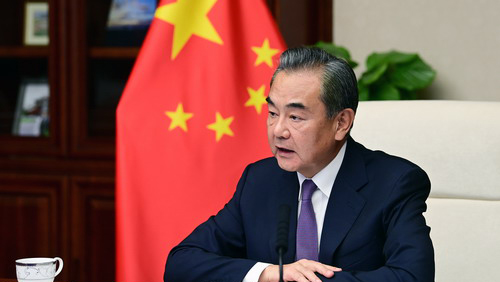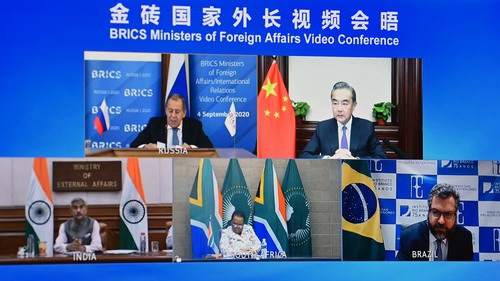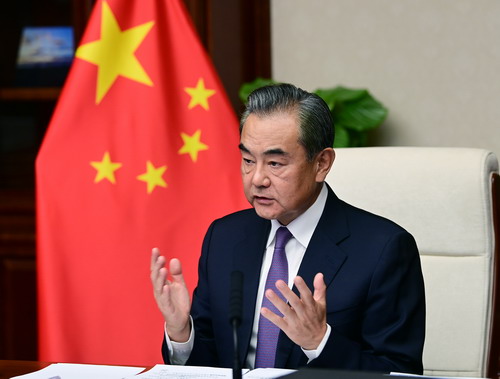00:26

BRICS countries should boost confidence, deepen cooperation and strengthen coordination so as to fulfill responsibilities for international peace and global development, Chinese State Councilor and Foreign Minister Wang Yi said Friday.
Wang made the remarks when attending the meeting of foreign ministers of BRICS on Friday via video link.
Russian Foreign Minister Sergei Lavrov presided over the meeting. Indian External Affairs Minister Subrahmanyam Jaishankar, South Africa's Minister of International Relations and Cooperation Naledi Pandor and Brazilian Foreign Minister Ernesto Araujo attended.
Wang said at present, the world is facing a series of new threats and challenges: the COVID-19 pandemic poses a direct threat to human health, unilateral bullying poses a severe challenge to the international order, and protectionism has had a major impact on the world economy.

Foreign ministers of BRICS countries hold a meeting via video link, September 4, 2020. /Chinese Foreign Ministry
Foreign ministers of BRICS countries hold a meeting via video link, September 4, 2020. /Chinese Foreign Ministry
At the same time, it should be noted that the trend of the times featuring peace, development, cooperation and win-win results has not changed, the law of development that economic globalization continues to move forward in twists and turns has not changed, and the basic trend of the rise of emerging economies represented by BRICS countries has not changed, Wang said.
BRICS countries should jointly deal with the challenges of the COVID-19 pandemic and jointly promote multilateralism, the recovery of the world economy, and political settlement of hot-spot issues, Wang added.
"As long as we maintain unity and work together, the BRICS countries can further become a force for safeguarding world peace and stability. This serves the common interests of BRICS countries and will benefit the whole world," Wang added.
The foreign ministers of the five participating countries had an in-depth exchange of views on the global situation, regional hot-spot issues and BRICS cooperation. All parties agreed that under the current circumstances, BRICS countries need to strengthen solidarity to meet challenges head-on.
Three-point proposal on Gulf situation
He reiterated China's support for addressing the Iran nuclear issue within the framework of the Joint Comprehensive Plan of Action (JCPOA) – also known as the Iran nuclear deal. Returning to the track of the 2015 agreement as soon as possible is the top priority for easing tensions in the region, he stressed, adding that there is no way out for unilateralism and so-called maximum pressure.
Read more:
China reiterates firm support for Iran nuclear deal
Timeline: Is the landmark Iran nuclear deal coming to an end?

Chinese State Councilor and Foreign Minister Wang Yi attends the meeting of foreign ministers of BRICS via video link, September 4, 2020. /Chinese Foreign Ministry
Chinese State Councilor and Foreign Minister Wang Yi attends the meeting of foreign ministers of BRICS via video link, September 4, 2020. /Chinese Foreign Ministry
The U.S. demand for initiation of the snapback mechanism to restore UN sanctions against Iran was opposed by the vast majority of Security Council members and BRICS countries, he noted.
Read more:
Wang Yi says U.S. demand for snapback on Iran 'completely unreasonable'
Iran: UN dismissal of sanctions snapback shows U.S. global 'isolation'
Secondly, Wang said affairs in the Gulf region should be resolved through dialogue and consultation among Gulf nations, which is the only way to maintain security and stability in the region. Relevant parties can build a platform for dialogue among countries in the region while maintaining the JCPOA, he suggested.
Thirdly, countries outside the region should inject positive energy into the efforts to restore peace and stability in the region, not the opposite, he stressed. All parties should uphold multilateralism and the international order in the process, he added.
(With input from Xinhua)